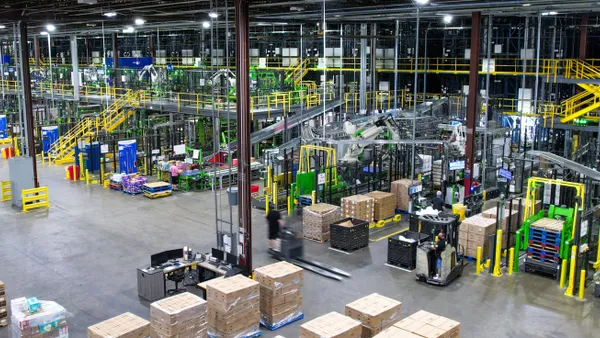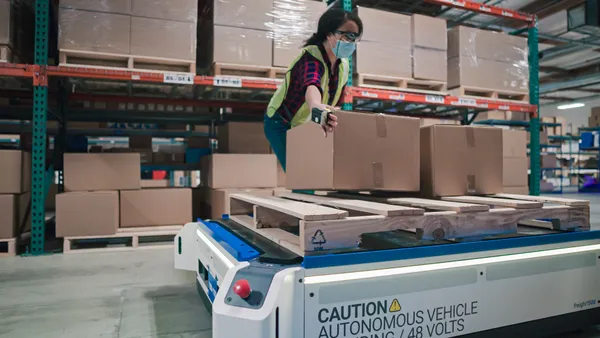Dive Brief:
- Nearly half (49%) of all companies have corporate supply chain sustainability goals, but another 35% lack such objectives, according to the first annual "State of Supply Chain Sustainability" report from the Massachusetts Institute of Technology (MIT) Center for Transportation and Logistics, and Council of Supply Chain Management Professionals (CSCMP), which included a survey of 1,128 supply chain professionals during the fall of 2019.
- Social issues — no child labor or slavery, worker welfare, etc. — received "far more" focus in companies' sustainability goals than environmental issues, such as carbon emissions or waste, the report found. The researchers called this "surprising," as environmental issues are usually considered to be at the center of the sustainability conversation. "The emphasis on social goals may derive from a belief in many companies that eliminating child labor and forced labor are a crucial starting point and are non-negotiable supply chain practices," the report reads.
- Carbon emissions and energy management were the most common environmental issues companies outlined in sustainability goals. The focus on these categories is partially the result of outside pressure, but also due to the recognition that increased energy efficiency is a clear way to reduce energy cost, the report notes.

Dive Insight:
Across industries — manufacturing, transportation/warehousing and retail — the top sustainability priority was the same: No child labor. They also all placed "no forced slave labor" and "worker welfare" as either the second- or third-highest priorities. After that, though, differences appeared in what the industries highlighted.
The report notes that the food sector specifically is "at the center of controversies around environmental impacts like clearcutting of rainforests and wide-ranging labor issues such as slave and child labor." The United Kingdom’s Modern Slavery Act, the California Supply Chain Transparency Act and the U.S.'s Dodd-Frank Wall Street Reform and Consumer Protection Act have pushed companies to focus on these areas, the report said.
The reputational impact of being involved with child labor and modern slavery can also play a role in the focus, according to the report.
"This emphasis was echoed in our media analysis, where reports of child and forced labor received a high level of negative sentiment from journalists reporting on corporate commitment, while progress with fair pay and local community engagement received high levels of positive sentiment," it reads.
Following social issues, retail was more concerned about waste than carbon emissions, but transport was more concerned about carbon emissions and energy management. Manufacturing, meanwhile, considered water and waste to be its biggest focus after social issues.
Recent changes to global regulations could change how companies prioritize sustainability efforts, the report noted, highlighting China's ban on imports of foreign plastic waste.
"This announcement shone a spotlight in 2019 on the massive waste and recycling problem worldwide, leading to a clear recognition that recycling systems are broken and that the waste problem has become untenable," the report said, adding that many have created circular economy sustainability goals as a result.
In UPS' most recent sustainability report, for example, the company outlines how it helps other companies to achieve such a circular economy with its logistics network.
"A more circular use of materials means lower costs and less waste," Unilever wrote in its most recent sustainability report. "It means new sources of value for our customers and consumers, better risk management of raw materials, and improved approaches to the supply chain."
Walmart is currently working with its suppliers in an effort to get them to reduce the amount of plastic packaging sent to the retailer, it said in its sustainability report.
The MIT and CSCMP report said the focus on water within the manufacturing industry is "aligned with production processes that often rely heavily on water, coupled with the growing risk of water insecurity near many global production sites."
Ford has taken the step of using treated wastewater at multiple facilities around the world in an effort to reduce water use in its operations, the manufacturer said in its sustainability report.
But the State of Sustainable Supply Chain report said that, while social issues are usually considered a top priority, a company's funding is often not aligned with the stated goal.
"This suggests that while companies are vocal on certain issues, their commitment may not always play out in practice," the report reads.
It also found that companies have begun to view supply chain professionals as playing an important role in sustainability with 80% of respondents saying they influence corporate sustainability efforts in some way.
"In light of this trend, it appears that the days of a separate sustainability department with a limited role are fading," the report said.
This story was first published in our weekly newsletter, Supply Chain Dive: Operations. Sign up here.















